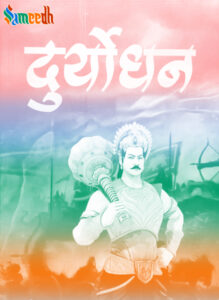Duryodhan was a central character in the Hindu epic, the Mahabharat, and he belonged to the Kaurav clan. He is one of the most celebrated and revered epics of Hindu mythology. His character is multifaceted and serves as a symbol of various aspects of human nature and ethical dilemmas.

The Kauravs and the Pandavs were two branches of the same royal family, the Kuru dynasty, and they were cousins. Duryodhan was the eldest son of King Dhritarashtr, who was born blind, and Queen Gandhari. Therefore, Duryodhan was born into royalty and was groomed to be the future king of the Kuru dynasty.
As the eldest son of King Dhritarashtr, Duryodhan was the heir apparent to the throne of Hastinapur, the capital of the Kuru kingdom. This position bestowed upon him immense power and influence within the Kuru dynasty.
From a young age, Duryodhan harbored deep jealousy and resentment towards his cousins, the Pandavs, particularly towards their leader, Yudhishthir. This jealousy was fueled by his desire for power and his belief that he was the rightful heir to the throne of Hastinapur.
Duryodhan’s rivalry with the Pandavs escalated over time, leading to various conflicts and confrontations. He played a significant role in the events that ultimately culminated in the great Kurukshetra War, including the infamous game of dice where he deceitfully gambled away the Pandavs’ kingdom and forced them into exile.
Duryodhan is often portrayed as having several character flaws, including arrogance, egoism, and a lack of moral integrity. His refusal to acknowledge the Pandavs’ rightful claims and his willingness to resort to unethical means to achieve his goals are recurring themes in the epic.
Throughout the Mahabharat, Duryodhan is depicted as a cunning and manipulative character who is willing to resort to deceit and treachery to achieve his goals. This is exemplified by his role in the infamous game of dice, where he manipulates events to cheat the Pandavs out of their kingdom and possessions. Duryodhan sought alliances with various kings and warriors to bolster his army against the Pandavs. He was advised by individuals such as his uncle Shakuni, who played a significant role in manipulating Duryodhan’s decisions for his own agenda.
Duryodhan was one of the principal commanders of the Kaurav army in the Kurukshetr War. Despite being warned by wise counsel, including his own family members, about the consequences of his actions, he remained steadfast in his resolve to defeat the Pandavs at any cost. He was also portrayed as a skilled warrior and strategist. He played a significant role in organizing the Kaurava army and formulating battle strategies, particularly during the Kurukshetra War, where he led his forces against the Pandavs.
Despite his formidable military prowess, Duryodhan was ultimately defeated in the Kurukshetra War. In the final battle, he engaged in a fierce duel with Bhim, one of the Pandav brothers, and was mortally wounded. His death marked the end of the Kaurav lineage.
Duryodhan’s character serves as a cautionary tale in the Mahabharat, illustrating the destructive consequences of unchecked ambition, envy, and moral corruption. He is often depicted as a complex and tragic figure, whose downfall was ultimately a result of his own flaws and hubris.
Overall, Duryodhana’s role in the Mahabharat is pivotal in driving the narrative forward and exploring themes of morality, justice, and the complexities of human nature. His character remains one of the most intriguing and debated figures in Hindu mythology.